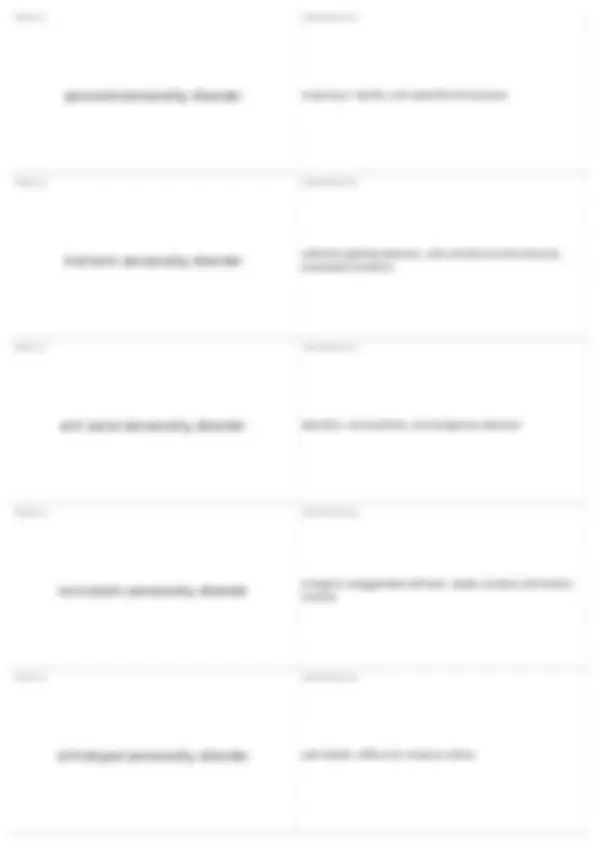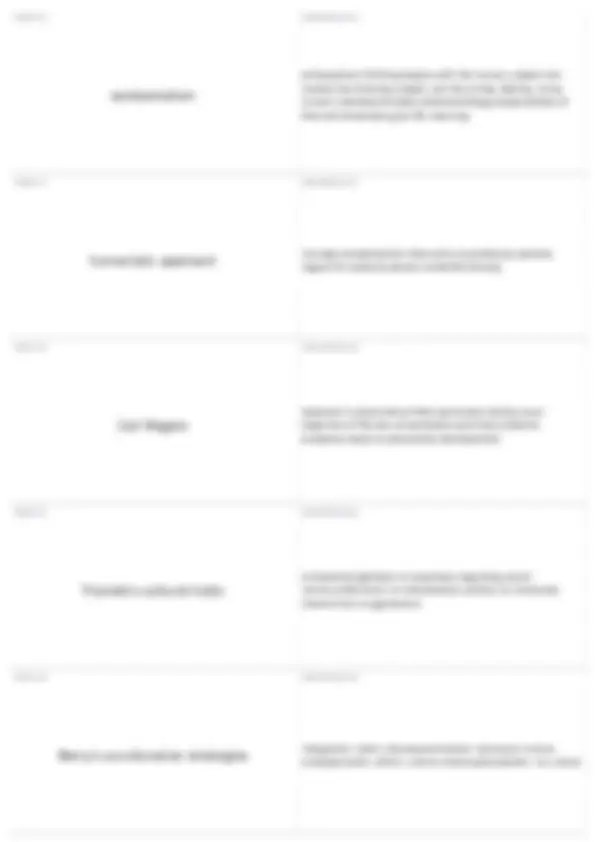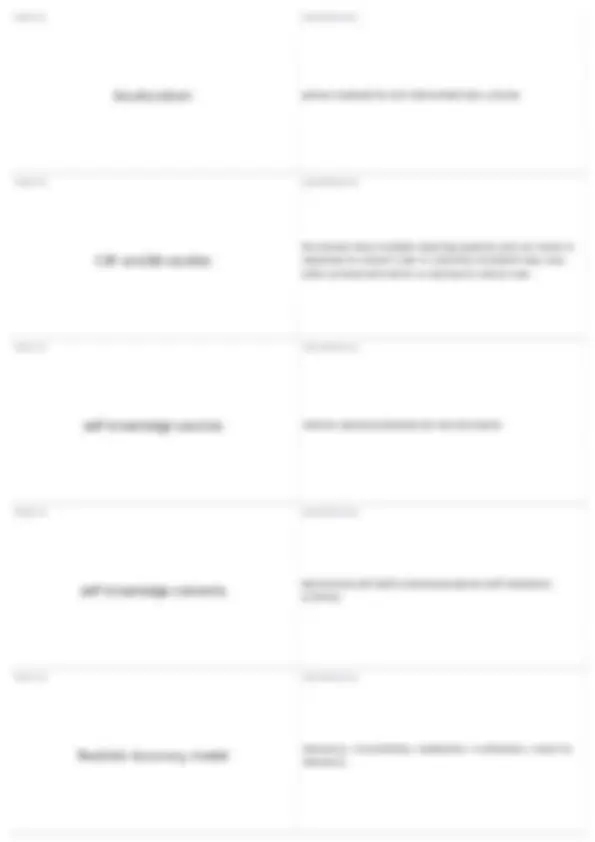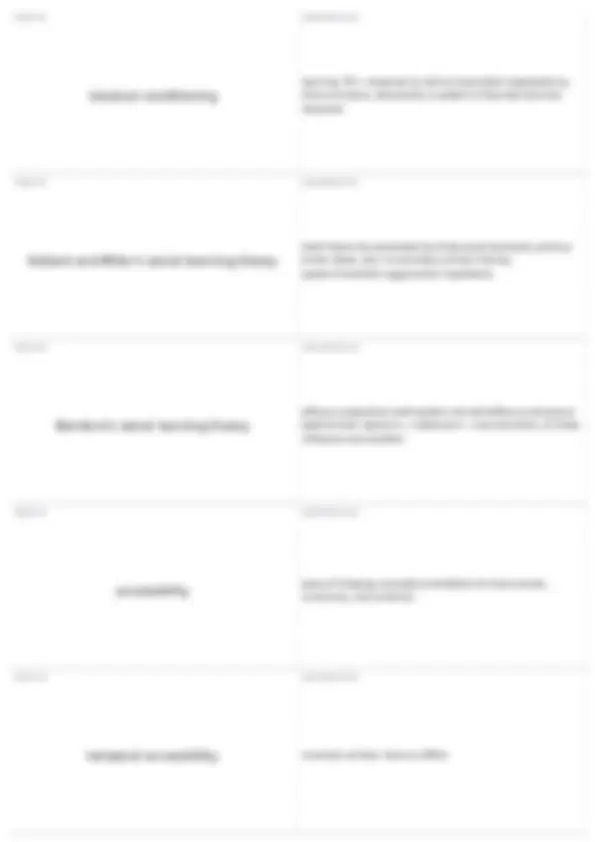









Study with the several resources on Docsity

Earn points by helping other students or get them with a premium plan


Prepare for your exams
Study with the several resources on Docsity

Earn points to download
Earn points by helping other students or get them with a premium plan
Community
Ask the community for help and clear up your study doubts
Discover the best universities in your country according to Docsity users
Free resources
Download our free guides on studying techniques, anxiety management strategies, and thesis advice from Docsity tutors
Definitions and explanations of key terms, approaches, and theories in personality psychology. Topics include different types of data, research methods, trait approaches, functions and advantages of trait approach, types of trait tests, and various personality theories such as adorno's, freud's, and erikson's. It also covers various personality disorders and related concepts.
Typology: Quizzes
1 / 13

This page cannot be seen from the preview
Don't miss anything!








Trait,biological,psychoanalysis,humanistic and cross- cultural,learning and cognitive TERM 2
DEFINITION 2 I data informant data, friends and family describing youL data life data, how you are fairing in life such as work backgroundS data self data with face validity, or measuring what it's supposed toB data behavioral data, measuring your actual behavior TERM 3
DEFINITION 3 case study method,correlational method,experimental method TERM 4
DEFINITION 4 reliability-data unaffected by anything elsevalidity-degree to which it is measuring what it is set out to measuregeneralizability-degree to which measurements apply to others TERM 5
DEFINITION 5 focuses on individual differences in personality and behavior, as well as the ABC's behind them
measure,summarize,predict TERM 7
DEFINITION 7 the three functions TERM 8
DEFINITION 8 consensus,similarities,inconsistencies TERM 9
DEFINITION 9 rational,factorial analysis,empirical TERM 10
DEFINITION 10 cardinal traits,central traits,secondary traits,common traits
denial,repression,reaction formation,projection,rationalization,intellectualization,displaceme TERM 17
DEFINITION 17
DEFINITION 18 has to have every decision made for them, with a bitter kind of agreeableness TERM 19
DEFINITION 19 feelings of inadequacy and fear of social contact TERM 20
DEFINITION 20 rigidly conscientious about everything, extreme perfectionism
suspicious, hostile, and resentful of everyone TERM 22
DEFINITION 22 attention-getting behavior, with shallow but dramatically expressed emotions TERM 23
DEFINITION 23 deceitful, manipulative, and dangerous behavior TERM 24
DEFINITION 24 arrogant, exaggerated self-love, needs constant admiration, shallow TERM 25
DEFINITION 25 odd beliefs, difficult to relate to others
Ascending Reticular Activating System,controls arousal and relaxation TERM 32
DEFINITION 32 neurochemical release,primary process is triggering central and peripheral nervous system,secondary process is reflecting on danger or risk which explains individual differences,and has generalizability across genders TERM 33
DEFINITION 33 any change across generations in the heritable personality characteristics of biological populations TERM 34
DEFINITION 34 evolutionary theory states that men want more partners in order to produce mroe children andpass along his genes to next generation, while women try to convince men to stay and protect family. TERM 35
DEFINITION 35 women look for power and money in order to support family,men look for beauty and fertility in order to produce healthy children
philosophical thinking begins with the human subject-not merely the thinking subject, but the acting, feeling, living human individualincludes phenomenology,responsibility of free will,throwness-give life meaning TERM 37
DEFINITION 37 includes existentialism (free will),unconditional positive regard for patients,person-centered therapy TERM 38
DEFINITION 38 believed in phenomenal field (perceived reality),main objective of life was actualization,said that authentic existence leads to personality development TERM 39
DEFINITION 39 complexity,tightness vs looseness regarding social norms,collectivism vs individualism,vertical vs horizontal (hierarchial vs egalitarian) TERM 40
DEFINITION 40 integration: both culturesassimilation: dominant culture onlyseparation: ethnic culture onlymarginalization: no culture
learning "B"= response to stimuli associated repeatedly by time and place, personality is pattern of learned stimulus- response TERM 47
DEFINITION 47 habit hierarchy,motivated by drives,psychoanalytic,primary drives (food, sex) vs secondary drives (money, power),frustration-aggravation hypothesis TERM 48
DEFINITION 48 efficacy expections (self-system and self-efficacy),reciprocal determinism (person<-->behavior<-->environment, all three influence one another) TERM 49
DEFINITION 49 ease of bringing concepts to forefront of mind,chunks, constructs, and schemas TERM 50
DEFINITION 50 concepts primed, recency effect
when people are asked to recall in any order the items on a list, those that come at the end of the list are more likely to be recalled than the others TERM 52
DEFINITION 52 repeated priming by evolution TERM 53
DEFINITION 53 inherited personality traits,includes activity levels, sociability, and emotionality TERM 54
DEFINITION 54 prediction that directly or indirectly causes itself to become true, by the very terms of the prophecy itself, due to positive feedback between belief and behavior TERM 55
DEFINITION 55 irrational jealousy, constantly expecting rejection due to childhood rejection or abuse, also a self fulfilling prophecy
mental resources, depend on cognitive load and motivation